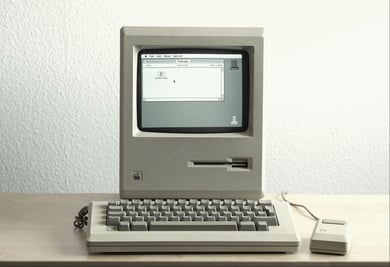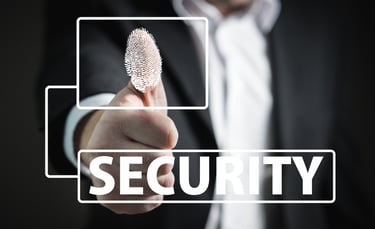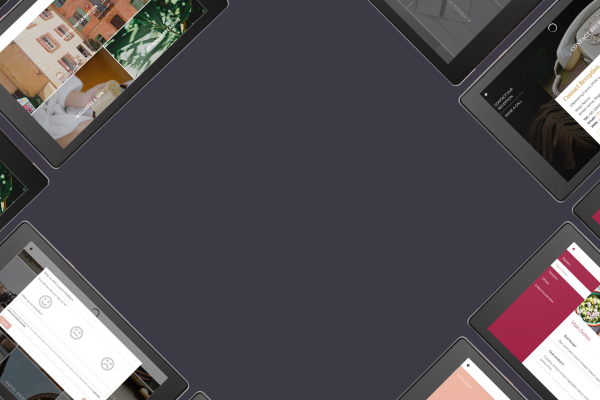In this blog post, we're going to clear up some misconceptions hoteliers may have about digitalization in the hotel industry.
 New technology being eyed with suspicion is nothing new – in 1916, Charlie Chaplin famously proclaimed that “cinema is little more than a fad”, and in 1943, Thomas J. Watson, the Chairman and CEO of IBM declared, “there is a world market for about five computers”. Of course, both were proven completely wrong, and the rest is history!
New technology being eyed with suspicion is nothing new – in 1916, Charlie Chaplin famously proclaimed that “cinema is little more than a fad”, and in 1943, Thomas J. Watson, the Chairman and CEO of IBM declared, “there is a world market for about five computers”. Of course, both were proven completely wrong, and the rest is history!
Suspicion and doubt about new technology are natural human reactions to change and the prospect of venturing into the unknown. Just like Chaplin and Watson, many hoteliers view new technology and digitalization in the hotel industry with suspicion and doubt. To challenge this, we have attempted to dispel some of the most common misconceptions that come with bringing hotels into the digital age.
Misconception 1: People from older generations don’t adopt digital solutions

Many hoteliers believe that digitizing their processes by investing in modern technology will alienate older guests – this is especially worrisome as people tend to travel more after retirement, proving to be a large source of revenue for many hotels. This view, however, is very outdated, and the numbers prove it!
According to research conducted by pewinternet.org, while only 42% of US seniors owned a smartphone in 2017, this number was 81% for households with an annual income of $75,000 and up. These numbers are likely to be higher for 2019 but this data has not yet been collected. In fact, the research indicates that household income and education levels are more accurate indicators of the likelihood to adopt new technology than age.
So, what does this mean? It means that the days of stereotyping seniors as technophobic cavemen stuck in the dark ages are over, and making this assumption is actually rather patronizing and restricting for the older generation. It’s clear that seniors have shown that they want to embrace the benefits that technology brings just as much as anyone else, and it’s up to us to provide it!
Misconception 2: The financial return will not make it worthwhile
Being in the hotel business means you’re also in the business of making money. For many hoteliers, the financial benefits of digitizing their guest communication channels might not seem obvious at first – upfront payments can sometimes appear high for something that, as of yet, hasn’t been widely adopted throughout the hotel industry.
At SuitePad, we can dispel this myth by looking at our own customer success. There are countless cases where customers have found that introducing our in-room tablets has boosted revenue by increasing sales such as room service and spa sessions, while also generating substantial cost-savings. Specifically designed features that accompany SuitePad mean there are very few customers who don’t increase their revenue after installing the in-room tablets!
A good example of this is our Green Option, which works by allowing guests to opt-out of having their room cleaned the following morning, saving the hotel money that would otherwise have been spent on cleaning staff and laundry services. At the Hotel Esplanade Bad Saarow, they found that in the first month of their SuitePad installation, they saved a total of €1,476.60 on room cleaning costs alone – this amounted to more than the total monthly licensing fee they were paying for the SuitePad service! On top of that, they increased visits to the spa and table reservations at the restaurant which increased revenue overall.
Hoteliers also often hear the words "in-room tablets" and envision buying an expensive tablet device for each and every room in their hotel. With some providers that use third-party devices such as iPads and Samsung Galaxy tablets, this may be the case. At SuitePad, however, we make our own devices, in our own factories, at a cost that's affordable for hoteliers. By having complete control of the production process, we're able to strip out the unnecessary and expensive elements that you pay for with third-party devices so our tablets are cost-effective while also specifically designed for the hotel room. Find out more about how our tablets work for the hotel industry in this recent blog post all about the SuitePad journey.
It’s important to explore the different ways digitalization of the hotel industry, and in particular, the digitization of guest communication can generate both increased sales revenue and cost-savings for your business. It may be that without exploring the potential digital solutions on offer, you are unwittingly throwing away money or missing out on opportunities for increased revenue!
Misconception 3: There’s little benefit beyond the financial aspect for hoteliers
Granted, the non-financial benefits of integrating digital guest communication are harder to quantify than the financial ones, but that certainly doesn’t make them any less significant!
Many hoteliers believe that their hotel guests can get by with traditional methods of guest communication – classic landline telephones and paper-based guest directories have been used for years, so surely guests can still get by with them? But, this misses the point! Guests could also get by with a blanket by a campfire if they really needed to – it’s not about what they need; it’s about what they want!
For some guests, landline telephones and stacks of worn-out paper that amounts to a guest directory—or even a blanket by a campfire for that matter—may be the preferred option, but for an increasingly large proportion of tech-savvy travelers, these methods are considered outdated and obsolete. As our everyday lives become increasingly more digital, the expectation for guest communication in hotels to become more digital also increases.
But, that doesn’t mean it should simply be implemented because it’s what guests want; it also offers the potential to really push beyond what many guests thought was possible such as providing an interface for integrated room controls, real-time communication with reception staff directly from the hotel room, and centralized access to all the hotel’s services. All of these benefits help guests tailor the experience they want from a hotel while also providing an interactive platform where hotels can clearly exhibit everything they have to offer. It provides more than just the limited one-way communication that comes with traditional paper-based guest communication such as in-room leaflets and basic telephone connections.
Early adopters will likely see the most success from digital guest communication as they will benefit from being able to offer a solution that’s cutting-edge for guests right from the beginning, while also getting a head start on adapting their business to the digitalization of the hotel industry as a whole.
Misconception 4: Maintaining digital guest communication is labor-intensive
Digital forms of guest communication are designed to save hotels on labor-intensive activities such as the need for receptionists to answer questions and to manage bookings for in-house activities such as spas and restaurants. However, some hoteliers still believe that with the introduction of new technology comes the need to employ more staff or have staff extensively trained on how to use it, therefore increasing overall staffing costs.
This is certainly not the case – in fact, digitizing processes such as answering simple questions using automated chatbots, allowing guests to by-pass the need to communicate with reception when booking activities in the hotel, and streamlining processes such as room cleaning, all reduce the need for staff to complete the more basic and mundane tasks necessary for every hotel to function. This means staff can focus on ensuring that the guest experience at the hotel is their main priority. Alternatively, the number of reception, cleaning, or administrative staff can be reduced, generating cost-savings.
There are, however, some areas where you may need to increase the number of staff. You may find that by making the hotel services more visible and booking platforms more intuitive, the demand for meals in the restaurant, treatments in the spa, or gifts from the hotel shop will increase. This, of course, will require hiring more service staff such as chefs, waiting staff, masseurs, and sales clerks. But these are the kind of staff you want more of! It shows that your hotel is thriving, providing more high-quality experiences to guests while also increasing revenue.
Misconception 5: You’re likely to land in trouble due to the limitations of data protection laws

This one is understandably a real concern for hoteliers who in Europe are still getting themselves up to speed with the relatively recent implementation of the GDPR regulations. To find out more about how the hotel industry is adapting to these regulations, check out our blog post: GDPR a Year On: How hotels and SuitePad ensure data protection.
In the U.S., the limitations on sharing customer data are still relatively relaxed, but there are still strict rules on how companies and any third-party vendors need to comply with data security regulations to ensure data isn’t leaked or accessed by hackers.
While customer data is, of course, something that needs to be protected to retain the trust of your guests, it’s also something that’s increasingly being shared across a variety of industries as the digitalization of services becomes more widespread. The conundrum for hoteliers is simple – you need to digitalize to meet guest expectations, but you don’t want to risk breaching their trust and potentially incurring a hefty fine. It is therefore important to adequately vet any vendors that you’re planning to do business with, but this should be a general rule that applies across the board, not just for digital communication vendors.
Here at SuitePad, we use usage information collected from our in-room tablets to help optimize the services offered by the hotels we serve. This is totally in line with the EU’s GDPR regulations, and under no circumstances would we store the personal data of customers beyond the timeframe of usage or pass it on to any third-party companies or services without first gaining consent directly from the customer. Our services have developed in tandem with the GDPR regulations, so they are always taken into consideration when we launch new services or educate our customers on how SuitePad services work. This is evidence that, even with the GDPR regulations in Europe, great quality digital services can still be offered without risking a breach of data or trust.
Dispelling those misconceptions
Luckily for Chaplin and Watson, their predictions about the movie and computer industries were completely wrong, and both went on to become hugely successful and influential in their respective fields. Make sure you follow in their footsteps by embracing digitalization at your hotel!
At SuitePad, we understand that when it’s your business at stake, it’s only natural to be wary of making major changes to how it’s run. But, it’s also important not to let unfounded suspicions and doubts stifle your potential, putting you at risk of being left behind while your competitors reap the rewards of innovation.
We hope that this blog post can act as a starting point for a better understanding of digitalization in the hotel industry, and in particular, the digitization of guest communication.
If you’d like to talk to a dedicated expert about how digital guest communication services can best be integrated into your hotel, or if you have any other questions regarding your own suspicions and doubts in this area, contact us here. You’re also more than welcome to check out our resources page for ebooks and white papers on the subject!
- Published on October 22, 2019




.png)
.png)
